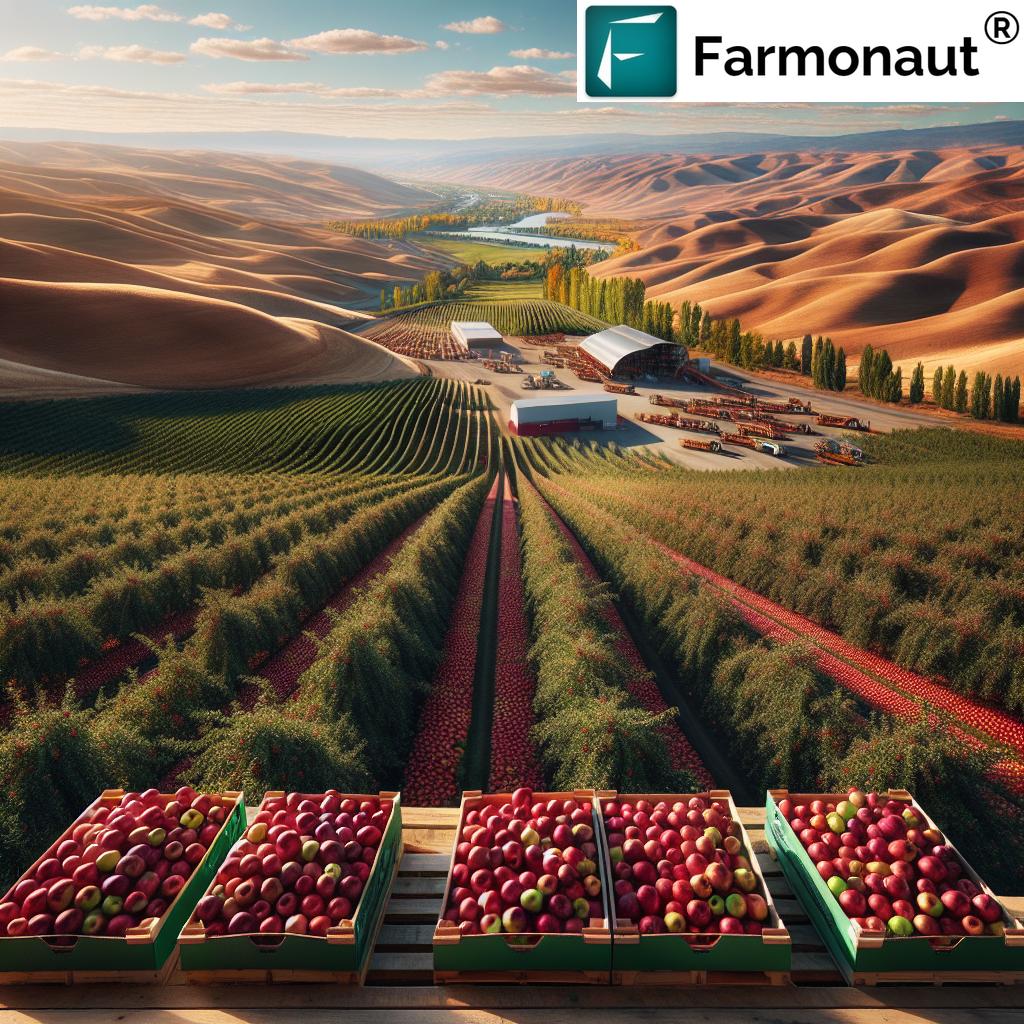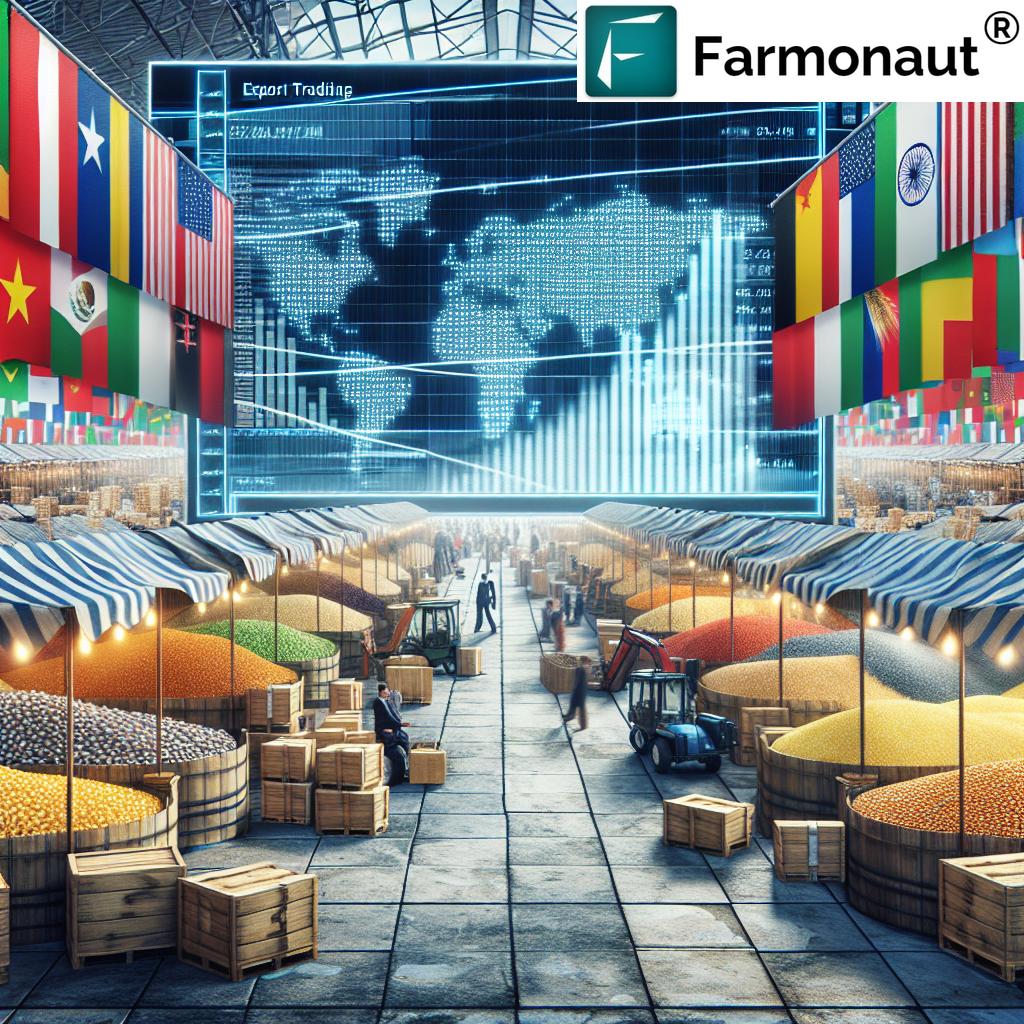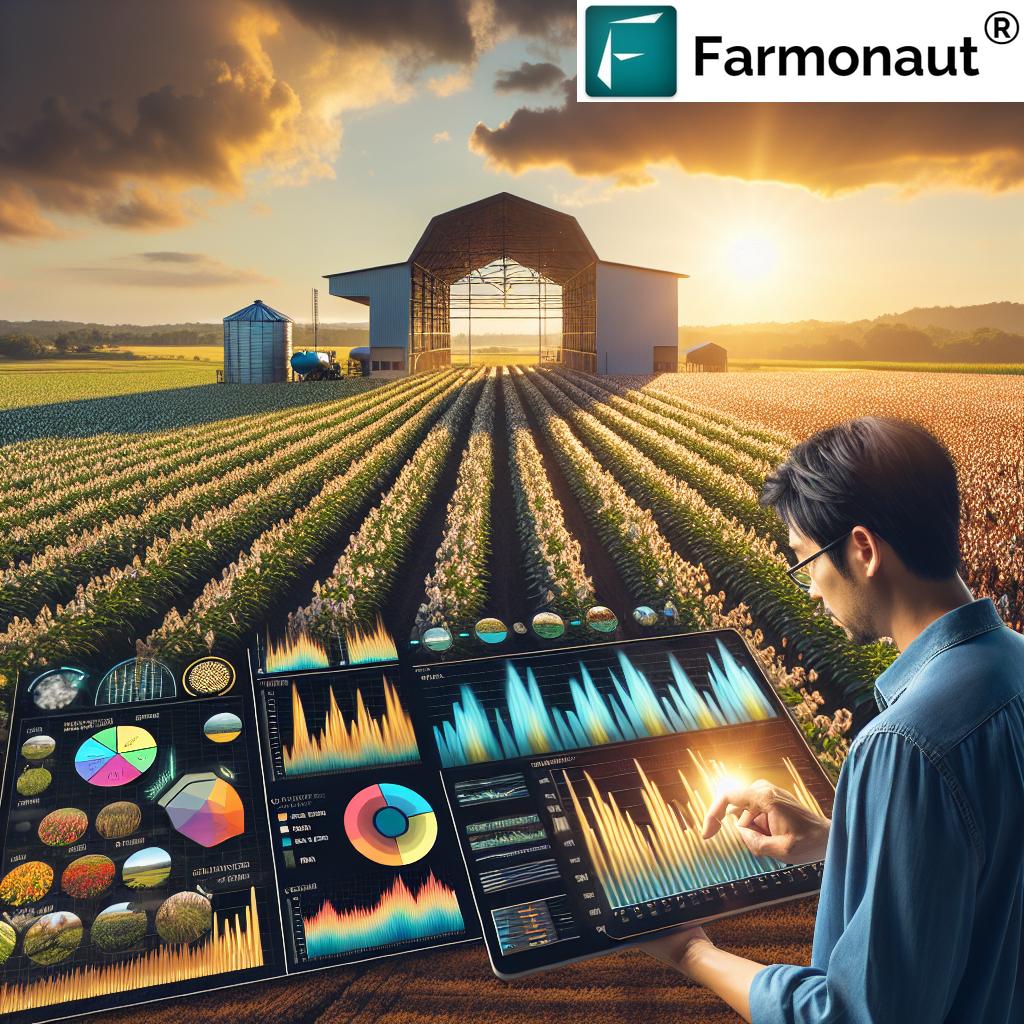Top Farmland REIT Stocks & ETFs 2025 for Agriculture: Diversified Growth & Sustainable Income
Summary: Investing in Farmland and Agriculture Stocks: A Comprehensive Guide for 2025
- Why Farmland Investment Makes Sense in 2025
- Understanding Farmland as an Asset Class
- What are Farmland REITs? Focus on Key Farmland REIT Stocks
- Comparison Table: Top Farmland REIT Stocks and ETFs 2025
- Exploring Farmland Stocks ETF: Diversification & Opportunity
- Individual Farmland-Related Stocks to Watch in 2025
- The Growing Importance of Sustainable Agriculture & Precision Farming
- Risks in Farmland & Agriculture Stocks
- How to Invest in Farmland in 2025
- Farmland Investment Outlook & Future Trends
- Farmonaut: Empowering Precision Agriculture and Sustainable Growth
- Farmonaut Subscription Pricing
- FAQ: Farmland REIT & ETF Investing for 2025
Why Farmland Investment Makes Sense in 2025
Global food demand is rising, climate change continues to impact traditional farming yields, and sustainability is at the forefront of investment trends. In this landscape, farmland reit stocks, farmland partners reit stock, farmland stocks etf, farmland stock, and the broader stocks agriculture sector are increasingly seen as attractive investment options for diversification, protection against inflation, and long-term growth.
In 2025, these investments combine the power of real estate—such as steady income through rental payments and the potential for land appreciation—with exposure to essential agricultural commodities that serve as the backbone of the global food supply. The intersection of environmental awareness, financial innovation, and next-gen farming practices is re-shaping the agriculture investment sector.
Understanding Farmland as an Asset Class
Farmland is a real asset class that offers a unique blend of benefits for investors in 2025:
- Physical Asset Stability: Unlike stocks bundled to intangible assets, farmland is essential for food, fiber, and increasingly, renewable resources.
- Hedge Against Inflation: Historically, land values and rental rates increase with inflation, preserving capital.
- Diversification: The performance of farmland investments is typically uncorrelated with equities and bonds, reducing overall portfolio volatility.
- Income: Rental income from tenants or sale of agricultural products offers consistent cash flow.
- Sustainable Solution: As regenerative practices and sustainability in farming gain traction, farmland investments contribute to carbon sequestration and environmental goals.
Population growth, changing dietary patterns, and climate change amplification are driving a push for increased food production. Investment in farmland directly supports the ability to meet these demands, and new technology is boosting yield potential even with weather and environmental challenges.
What Are Farmland REITs? Focus on Key Farmland REIT Stocks
A Real Estate Investment Trust (REIT) specializing in farmland acquires, manages, and leases agricultural land, distributing the majority of its taxable income as dividends. Farmland REITs combine property investment’s stability with the growth potential of agriculture, offering attractive options for those seeking low-volatility, steady income.
Investing via farmland reit stocks means gaining exposure to diversified farmland portfolios without direct ownership headaches. REITs handle land management, tenant relations, capital improvements, and compliance—allowing investors to benefit from crop revenues and land appreciation as passive shareholders.
Spotlight: Farmland Partners REIT (NYSE: FPI) – A Farmland REIT Stock
Farmland Partners Inc. (NYSE: FPI) is among the largest and most liquid publicly traded farmland REITs in the United States, with a broad portfolio across agricultural states. In 2025:
- Diversification: FPI owns or manages millions of acres hosting row crops (corn, soybeans, cotton, wheat) and specialty lands—boosting resilience against single-crop volatility.
- Sustainability Focus: FPI is investing in carbon monitoring and regenerative farming practices, positioning farmland as an ESG-aligned asset for 2025.
- Financial Performance: Despite regional weather impacts and regulatory noise, rental income and dividend yields remain competitive among REITs—backed by solid land values and smart acquisitions.
- Growth Strategy: Targeted land purchases in emerging agricultural regions and strategic divestments of underperforming properties enable continued portfolio quality improvement and capital reallocation.
As with any stock, FPI has risks, including exposure to commodity prices, weather events, tenant defaults, and changing regulations. Nonetheless, it’s a prime benchmark in the farmland reit stock sector.
Other Notable Farmland REIT Stocks: Gladstone Land Corporation, American Farmland Company, and More
Beyond Farmland Partners, Gladstone Land Corporation (NASDAQ: LAND) stands out for its focus on organic and specialty crop farmland. Their portfolio features produce farms—responding to growing demand for organic and health-conscious food. Gladstone’s business model involves long-term leases (often linked to inflation), supporting stable income even in volatile years.
Other private and public companies—such as American Farmland Company and Goodfarmer LLC—each have distinguishing features (geographic focus, specialty crops, risk profile), broadening investors’ choices in aligning investment goals and values.
Comparison Table: Top Farmland REIT Stocks & ETFs 2025
| Name of REIT / ETF | Estimated Dividend Yield (%) | Est. Annual Return (%) | Fund Size / Market Cap (USD millions) | Geographic Focus | Sustainability Initiatives | Risk Level |
|---|---|---|---|---|---|---|
| Farmland Partners Inc (FPI) REIT Stock | NYSE: FPI |
3.4 | ~9.8 | $900 | US Nationwide | Regenerative agriculture, carbon monitoring, ESG focus | Medium |
| Gladstone Land Corporation (LAND) REIT Stock | NASDAQ: LAND |
2.8 | ~8.6 | $825 | US: CA, FL, Midwest | Organic farming, water conservation | Medium |
| VanEck Agribusiness ETF (MOO) ETF |
1.5 | ~6.2 | $1,950 | Global | Direct/indirect sustainable agriculture exposure | Medium |
| iShares Global Agriculture Index ETF ETF |
1.3 | ~5.4 | $980 | Global | Companies with sustainability disclosures | Medium |
| Global X Fertilizers/Potash ETF (SOIL) ETF |
1.0 | ~6.1 | $490 | Global | Focus on soil health, fertilizer innovation | High |
| American Farmland Company REIT Stock (private) |
2.1 | ~7.2 | $350 | US: Midwest | Soil regeneration projects | Medium |
This table offers a snapshot comparison of the leading farmland reit stocks and farmland stocks etf in 2025, with specific attention to their income, growth, diversification, and sustainability metrics to support your investment decisions.
Exploring Farmland Stocks ETF: Diversification & Opportunity
For investors seeking broad, diversified exposure to the evolving world of agriculture and farmland, ETFs are a compelling, easy-to-trade solution. While there are limited pure farmland ETFs, the thematic agriculture ETFs integrate farmland reit stocks with other agribusiness companies, equipment manufacturers, and food producers, boosting portfolio diversification and reducing individual risks.
- VanEck Agribusiness ETF (MOO): Provides global access to agriculture businesses, including equipment, seed, fertilizer, and agrochemical giants.
- iShares Global Agriculture Index ETF: Combines exposure to farm support companies, food production, and select REITs.
- Global X Fertilizers/Potash ETF (SOIL): Specializes in companies optimizing soil nutrition, connecting back to the productive capacity of farmland.
These ETFs offer income through regular dividends and allow for tactical adjustments as agriculture and farmland trends change.
Since commodity prices and weather events can spark short-term volatility, a diversified basket with ETFs reduces risks for investors, especially in dynamic market conditions expected through 2025.
Farmonaut’s Fleet and Resource Management tools help large agribusinesses and ETF stakeholders optimize equipment operations, improving efficiency and reducing operational risks associated with large-scale farming investments. Learn more about how resource management solutions support large scale farm efficiency.
Individual Farmland-Related Stocks to Watch in 2025
While REITs and ETFs offer instant diversified exposure, savvy investors may choose individual stocks with roots in agriculture, equipment, and the agri-food supply chain. Performance is closely tied to farmland productivity, commodity prices, and technological adoption across the sector.
- Agricultural Equipment Manufacturers: Deere & Company (NYSE: DE) and AGCO Corporation (NYSE: AGCO) produce machinery pivotal to efficient, large-scale farming operations. Their growth benefits from increased investment in precision farming and sustainable agriculture.
- Agrochemical & Input Suppliers: Corteva (NYSE: CTVA), Nutrien Ltd. (NYSE: NTR), and Mosaic Company (NYSE: MOS) are major producers of seeds, fertilizers, and crop protection—critical to improving yields and land values.
- Commodities and Trading Giants: Archer Daniels Midland (NYSE: ADM) and Bunge Limited (NYSE: BG) operate at scale in commodities trading, processing, and food supply logistics, thus are closely linked with farmland success and global agricultural trends.
Although these are not direct farmland stock investments, their success is tightly interwoven with healthy, productive agriculture and robust farmland investing.
Additionally, cutting-edge agritech solutions—like Farmonaut’s blockchain-based traceability services—are enabling supply chain transparency and authenticity for global food companies, food manufacturers, and agribusiness investors. Discover how blockchain traceability secures origination and prevents fraud in agricultural investments by visiting our Traceability solutions page.
The Growing Importance of Sustainable Agriculture & Precision Farming
By 2025, responsible agriculture is inseparable from effective farmland investment strategy. Environmental pressures—from climate change, soil depletion, and biodiversity loss into the mainstream—are fueling the adoption of precision farming, regenerative practices, and carbon management solutions throughout the agricultural sector.
- Precision Agriculture: Next-gen tools, satellite imagery, and AI—like those offered by Farmonaut—enable farmers to make data-driven decisions for smarter resource allocation, reducing input waste and boosting yield.
- Regenerative Farming: Techniques such as cover cropping, rotational grazing, and conservation tillage improve soil health, increase resilience to weather shocks, and drive ecosystem benefits—and are increasingly incentivized by REITs for leased land.
- Carbon Footprinting: Tracking and reducing farm-level carbon emissions is not just good for the planet—a carbon footprinting solution is now key for meeting regulatory requirements and attracting ESG capital.
Did you know? Farmonaut also provides a blockchain-backed traceability system to ensure every step from farm to market is transparent. This aligns perfectly with the rising importance of sustainability in global food production and international agricultural investments.
The ESG investing wave is reshaping capital flows into farmland reit stocks, farmland partners reit stock, and related stocks agriculture sectors. Sustainability is now as important as yield.
With threat of climate volatility and resource constraints, products like Farmonaut’s carbon tracking and satellite-based crop loan and insurance verification greatly reduce risk for both farmers and financial companies investing in farmland assets. Explore how satellite-based crop insurance and lending de-risks farmland finance.
Risks in Farmland & Agriculture Stocks
Despite their promise, investing in farmland reit stocks, farmland stock, and agriculture ETF products comes with unique risks:
- Weather and Climate Events: Drought, hail, and floods directly reduce yields, impacting lease values, crop production, and company profitability.
- Commodity Price Volatility: Rapid changes in crop prices affect farm profits and, consequently, REIT dividends and land values.
- Regulatory Shifts: Environmental policies, trade restrictions, subsidies, and tax code updates can influence sector returns and operational flexibility.
- Tenant Performance: On farmland leased by REITs, tenant financial health is crucial; defaults lead to reduced rental income and delayed returns.
- Liquidity Constraints: Direct land investment and smaller REITs may have limited liquidity.
Mitigating these risks means adopting a diversified approach (using ETFs, select stocks, and different geographies), maintaining due diligence, and leveraging technology—such as Farmonaut’s satellite crops monitoring platform—to keep informed of environmental and operational change in real time.
How to Invest in Farmland in 2025: Steps and Approaches
Depending on investing style, capital available, and desired exposure to agricultural risk, there are several main approaches to farmland investment:
-
Direct Land Ownership:
- Full operational control and direct profits, but requires intensive management and incurs liquidity risks.
- Best suited for experienced investors or those with access to specialized advisory solutions—such as Farmonaut’s large-scale farm management suite for monitoring, yield estimates, and resource allocation.
-
Farmland REIT Stocks:
- Trade like other shares on major exchanges (e.g., NYSE: FPI, NASDAQ: LAND).
- Offer robust income and easier liquidity, diversification, and passive management.
-
Farmland Stocks ETF:
- Blend direct and indirect exposure to global agriculture markets, risk spreading across regions, sectors, and companies.
- Accessible on many trading platforms with lower transaction costs.
-
Agriculture and Agribusiness Stocks:
- Targeted plays on input producers, equipment manufacturers, and food logistics companies.
- Higher potential for capital appreciation, but often greater volatility.
-
Innovative Digital & Advisory Platforms:
- Integrate real-time farm monitoring apps, crop insurance, and blockchain traceability for transparency and risk reduction. Explore Farmonaut’s digital platform now.
Farmland Investment Outlook & Future Trends (2025+)
The future of farmland reit stocks, farmland stock etf, and related agriculture investments is underpinned by:
- Persistent Food Demand: Population growth and urbanization will increase demand for essential commodities.
- Fintech & Technology Innovation: Satellite monitoring, digital tracing, AI-based advisories, and precision ag tools facilitate better yields and smarter capital allocation. Farmonaut’s technology is at the forefront, empowering this shift.
- Climate, Policy & ESG Forces: Regulatory and consumer pressure ensure the sector remains dynamic, with increased incentives for sustainable and regenerative farming.
- Land Scarcity: The supply of productive agricultural land is limited, driving capital appreciation potential and investor competition for high-quality assets.
- Global Diversification: International avenues (EMEA, Americas, APAC) offer diverse, region-specific risk–reward profiles.
- Increased Digital Platform Penetration: Solutions such as Farmonaut are making precision farming affordable, thus increasing global smallholder participation in efficient, sustainable farming.
Short-term volatility remains an issue given geopolitical, supply chain, and weather-driven events. But, the long-term outlook for farmland reit stocks and agriculture stocks is robust for 2025 and beyond.
Farmonaut: Empowering Precision Agriculture and Sustainable Growth in Farmland Investment
At Farmonaut, we deliver the precision, transparency, and scalability modern agriculture investments demand in 2025:
- Satellite-Based Crop Health Monitoring: Our web, Android, and iOS apps provide multispectral crop/soil status insights to farmers and investors, bolstering decision-making and protecting productivity.
- AI-Driven Jeevn Advisory System: We translate complex satellite data—coupled with real-time weather data—into actionable farm and asset management advisories, maximizing yields and minimizing risks.
- Blockchain Traceability: Our solutions directly address investor and consumer transparency concerns, providing trusted, tamper-proof crop origin and chain-of-custody traceability.
- Fleet & Resource Management: Our tools optimize logistics and operational costs, crucial for large-scale farm assets in REIT and ETF portfolios.
- Carbon Footprinting: Real-time carbon tracking supports sustainable, ESG-aligned investment by quantifying and reducing environmental impacts.
- Access to Finance & Insurance: We assist in crop loan and insurance verification using satellite assessment, streamlining lending and risk mitigation for agricultural investors.
- Scalability & Accessibility: Serving everyone from smallholder farmers to international agribusinesses and asset managers with scalable, modular services, through API, web, and mobile platforms (API access | developer docs).
By making precision agriculture accessible and affordable, we help investors, operators, and institutions monitor assets, identify risks, and unlock growth—for better financial and sustainability outcomes. Explore how large-scale farm management works with Farmonaut.
Farmonaut Subscription Pricing
FAQ: Farmland REIT, Farmland Stock ETF & Agriculture Investing 2025
Farmland REITs provide steady income via rental payments and allow investors to gain exposure to the growth in agriculture with lower volatility than traditional stocks. In 2025, greater demand for food, technology adoption, and sustainability trends enhance their appeal.
Q2: What are the main risks in farmland and agriculture investments?
Key risks include weather and climate events, commodity price volatility, regulatory changes, and operational disruptions. However, technology (like Farmonaut’s platform) and diversification through ETFs help mitigate these concerns.
Q3: Can I invest in global farmland and not just US-based REITs?
Yes. Many ETFs offer diversified exposure to international agriculture and farmland companies. Direct investment in global farmland usually requires thorough due diligence and partnerships with local operators.
Q4: How does sustainable farming impact farmland investment portfolios?
Sustainable practices (regenerative agriculture, carbon management) improve land value, reduce risk, and attract ESG-driven capital. Farmland investments aligned with sustainability generally enjoy higher long-term returns and market premiums.
Q5: How does Farmonaut support investors in farmland and agriculture?
We offer digital crop health monitoring, advisory services, carbon tracking, blockchain traceability, and operational optimization for investment managers, farmers, and agribusinesses globally. These services drive higher yields, sustainability, and transparency for all stakeholders.
Conclusion: Why Farmland REIT Stocks & ETFs Should Be On Every Investor’s Radar for 2025
In the rapidly evolving landscape of agriculture finance, farmland reit stocks, farmland partners reit stock, farmland stocks etf, and related investments stand out for their blend of steady income, robust growth potential, and direct contribution to essential global food security needs. The world’s growing population, technological leaps in farming and climate adaptation, and the pressing need for sustainable solutions make farmland investment a smart play into 2025—and Farmonaut’s data-driven technologies help de-risk and enhance this opportunity for investors and operators alike.
Whether you prefer the liquidity and ease of REITs and ETFs, the targeted play of individual agribusiness stocks, or wish to explore the digital transformation of agriculture, the time is right to diversify and future-proof your portfolio with exposure to the land that feeds the world.
Looking for smart, data-driven farm asset monitoring and management? Download Farmonaut apps below or explore our API.














